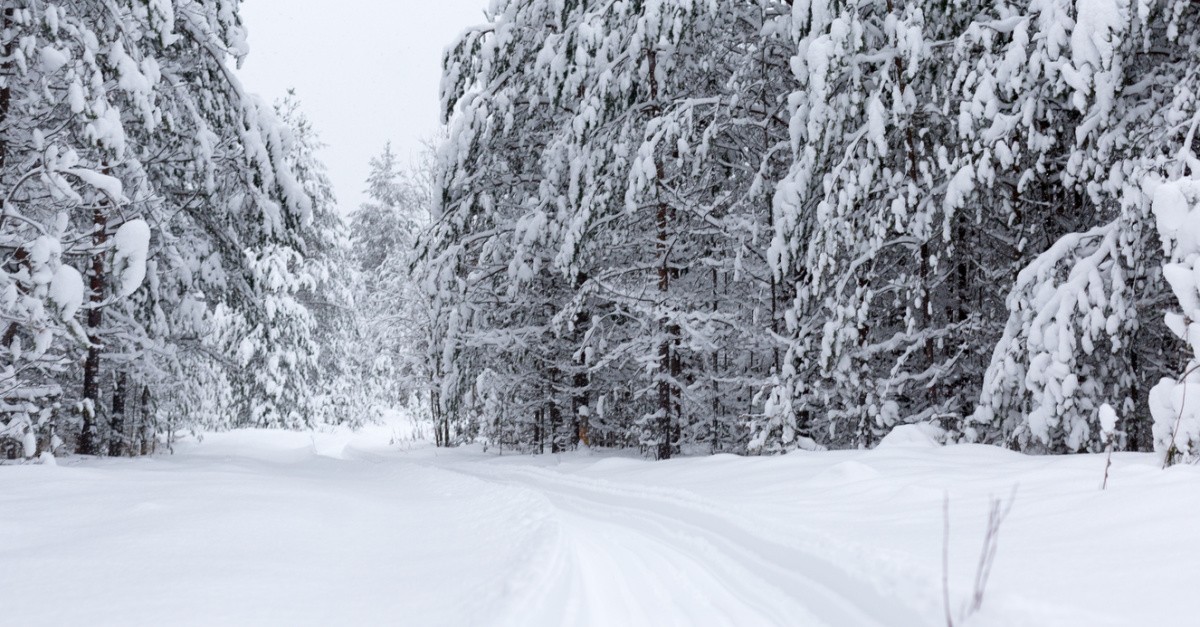
For the parts of the world that have cold winters, this season is a time of quietness and darkness. Nature sleeps as trees stand bare and the bulbs of flowers and seeds of plants lay dormant under the blanket of earth and snow. Many animals enter a period of hibernation.
The days are shorter, reducing the number of sunlight hours. Yet, for many of us, our lives continue as normal with hectic schedules, endless connection to devices, and relentless goals to be productive and complete tasks. We ignore the cycle of God’s creation – of nature’s example of the need to rest.
Is it any wonder, then, why a lot of us are burned out? Modern culture encourages an attitude that is focused on accomplishing and being preoccupied with a device. But the Lord did not design us to always work or live behind a screen. He incorporated rest into His design, as shown by His decision to stop and admire all He had made during the six days of creation (Genesis 2:2-3). And our week is patterned after creation – completing work (which is good to do) but also resting (Exodus 20:9-11).
Winter is a season that invites us to do just that: to pause from our frenzied flurry of tasks and find refreshment in the Lord and His blessings. The trees and seeds, animals, and weather all tell us it is so. Perhaps we can learn from their examples and engage in a less hurried way of life. To slow down and find renewed hope and purpose in Christ.
As it is, winter must pass before the first blooms of spring emerge. We will find that our lives are fuller and more satisfying when choosing to rest as the Lord intended.
Consider the following eight ideas to slow down and rest this season. Establishing such habits and rhythms now can help us engage more meaningfully with the spiritual disciplines of sabbath and rest throughout the year.
Photo Credit: ©Getty Images/FotoDuets

1. Reduce Commitments
One of the reasons people find it hard to rest is because they are trying to fill their days with too much. Somehow, we believe we can accomplish more than is feasibly possible as humans. Those extra tasks at work could impress our boss but keep us in the office past our shift and on weekends. Trying to cook everything from scratch while balancing a job and raising children. Or we can use our few handfuls of hours in the evening to start and successfully run a side business. We are overcommitting ourselves.
To practice rest, we must learn from the example of Martha and Mary in Scripture. Martha was busy with numerous preparations to show hospitality to Jesus, and she was upset that Mary did not help. Her sister sat at the Lord’s feet, listening to His teaching. Jesus addressed the anxious Martha with a gentle rebuke. As He said, “You are worried and upset about many things, but few things are needed—or indeed only one. Mary has chosen what is better, and it will not be taken away from her” (Luke 10:41-42, NIV). Martha’s intention of serving was not wrong, but she was missing something greater – time with the Lord.
To intentionally slow down and spend refreshing moments with our Savior, we must clear away the unneeded commitments in our lives. Some of these may be good things, like Martha’s preparations, but we must make way for the better things to create space in our lives for what truly matters.
Photo Credit: ©GettyImages/shironosov

2. Eliminate Distractions
Numerous people are overcommitted, but most individuals are also overstimulated. With cell phones always by our side, we have unlimited access to the internet and social media. Scrolling through a feed or watching reels is much easier than talking to God in those snatches of free time and quiet. Such habits ensure we are always preoccupied and entertained with the next dopamine hit. Too often, though, this constant use of devices makes us distracted. We cannot eat a meal with a friend without pulling out a phone, let alone stay focused while praying for more than a few minutes.
If we want to decrease our pace and be more intentional about our walk with Christ, then we will need to eliminate distractions from our lives. Some of us will need to continue to engage with devices, whether for our job or to stay in communication with others. For others, though, fasting from social media or cutting it out altogether might be a wise option. Either way, limiting the amount of time we spend behind a screen can help us engage more with rest.
Instead of scrolling when we first wake up, we can be still in God’s presence, listen to what He says in His Word, and be renewed by our time with Him (Psalm 46:10). We could open our days to talk more to the Lord and pray without ceasing (1 Thessalonians 5:17). Or to be more present with those around us, loving and serving them as Christ has commanded (John 13:34; 1 Peter 4:8).
Photo Credit: © Unsplash/Noah Benjamin

3. Take Breaks throughout the Day
Because of job requirements or financial needs, some individuals will not get much time off. And even on the days they do, there are other responsibilities such as grocery shopping, cleaning, meeting with other believers for fellowship, and time with family. An entire day of rest is not possible for all.
The Lord’s call to get away and find rest in Him still applies amid the responsibilities. We might not get an entire day to recharge. Yet, we can choose to incorporate breaks and times of refreshment into our days. Ten or fifteen minutes in the morning to pray, study Scripture, and worship. A part of the evening to appreciate an album or poem. The company of friends and family around a dinner table. A quick loop around the block with the dog to enjoy the fresh air. These tidbits of time can refresh us and are moments for which to praise God.
So, look for the blocks of time, even if they are only a few minutes, in which you can rest in Christ. If you are too tired and cannot think of any, then reconsider Jesus’ call: “Come to me, all you who are weary and burdened, and I will give you rest. Take my yoke upon you and learn from me, for I am gentle and humble in heart, and you will find rest for your souls. For my yoke is easy and my burden is light” (Matthew 11:28-30, NIV).
Photo Credit: ©GettyImages/Mkovalevskaya

4. Intentionally Engage with an Enjoyable Activity
Resting is sometimes confused with ceasing all activity. The Israelites stopped all work on the Sabbath, and many people apply this to their own days of rest (Exodus 20:10). From Jesus’ example, though, we see that the Sabbath was meant to benefit man and that it is good to help others on the day of rest (see Matthew 12:10-12; Mark 2:27). He also fulfilled this aspect of the Law; in that we are no longer required to observe the Sabbath (Matthew 5:17). However, the principle of resting still applies.
Does a day of rest, then, mean we cannot engage in any activity? Certainly not! Many of us enjoy events and hobbies and view the practice of such activities as a way to rest. Perhaps someone enjoys cooking or playing tennis. Others may decide to read a book, make a craft, carve wood, or help their children build a new Lego set. This is all technically “work,” but it is recharging and life-giving work. Finding joy in these activities surely brings pleasure to God – the One who is always working (John 5:17).
During the colder months, we can experience refreshment by ensuring we make time for something we enjoy, even if it is only for a few minutes each day or an hour or two each week. Whether we paint, play, write, walk, or plan for a spring garden or other project, we can recharge by engaging in these activities. For restful work, like every other good gift, is from the Lord (James 1:17).
Photo Credit: ©Unsplash/Mira Kemppainen

5. Plan a Mini Spiritual Retreat
If we find ourselves in need of an extended period of rest this season, then going on a retreat is a wonderful opportunity to recharge and reorganize our priorities. And we need not even leave our city to do so. Although some individuals may have the financial resources to attend a weekend or weeklong spiritual retreat out of state, others can create their own mini retreat at home. The goal is the same regardless of the location – getting away to spend time alone with the Lord.
Jesus regularly went to lonely places to talk to the Father (see Luke 5:16; 6:12-13). As His disciples, we also need these times of quiet and solitude to pray and rest in the presence of the Lord. To experience physical, mental, and spiritual refreshment by stepping away from our normal lives and reorienting our focus. Jesus’ call to the disciples applies to us: “Come with me by yourselves to a quiet place and get some rest” (Mark 6:31, NIV).
Life happens, of course, as it did for Christ and His followers. Large crowds followed Him to the solitary place, resulting in the miraculous feeding of the five thousand (Mark 6:32-44). Resting in Jesus can happen even amid the challenges of everyday life.
A partial spiritual retreat, sandwiched in half a day during the weekend or during the period when children are at school, is still valuable. Regardless of the length, schedule the time, show up ready to listen to the Lord in His Word, and spend quiet time resting in His loving friendship.
Photo Credit: © Unsplash/Mike Blank

6. Take Time to Give Thanks in the Ordinary Moments
Gratitude enables us to slow down and notice the everyday blessings from God. We give thanks, for example, for the ability and health to work, for the joy of a warm meal, and for shelter from the elements. Deliberately choosing to notice these aspects of our ordinary lives invites us into a posture of restful gratitude. We pause, breathe, and offer a prayer of praise to the Lord.
Taking note of God’s goodness in our daily lives also helps us practice the biblical instruction to give thanks in every circumstance (1 Thessalonians 5:18). Major occasions and holidays should not be the only times we tell God how grateful we are. Each day and every breath is only possible because the Lord is sustaining us and the world (Colossians 1:17). He is the reason we have strength for the present and hope for the future.
To better lean into our Savior during these cold months, we can adopt a habit of thankfulness. Doing so allows us to notice all the ways He has been with us and provided us with what we need. For in Jesus, we truly have all we need for life and godliness (2 Peter 1:3).
Photo Credit: ©Tetiana Shyshkina/Unsplash

7. Allow Yourself to Linger
When was the last time you allowed yourself to be present in the moment? Or to linger during an aspect of the day that compelled you to worship God instead of anxiously pushing ahead with your schedule? We lose precious moments by trying to cram so much into our days and attempting to capture occasions for social media. We think, “In the future, I will be able to enjoy the blessings of God,” or “If I post these crafted pictures, then I can show others that my life has meaning.” Soon, we find that we are striving for tomorrow or the next post instead of actually living.
Although there is nothing wrong with sharing key moments of our lives with those we love, we do not want to risk the blessing of these times by always attempting to capture the perfect version of our experiences. And doing so is exhausting.
Instead of trying to rush through our days or record every key event, what if we allowed ourselves to linger and praise God for the moment? When we see a beautifully clear winter night sky, enjoy the warmth of a cup of tea or celebrate a quiet snowfall with friends. These are all gifts from the Lord, and we can appreciate them more in a restful pause.
If only we would cease our striving and slow down. Then, our lives would turn from anxious movement chasing the next task to a peaceful acknowledgment of God’s work and blessings each day. We would throw off our worry about tomorrow because we know that the Lord has been faithful today (see Matthew 6:25-27, 34).
Photo Credit: ©Unsplash/Jakob Owen

8. Practice Contentment
Let us be honest, problems in life will occur. Loved ones will die. We may struggle with illness, and friends can leave. During winter, these realities can become more apparent. To many of us, the future may appear as bleak and dead as the bony-looking trees and brown grass.
Jesus never promised us that the Christian life would be easy or that everything would always go well. But what He did promise was an abundant life – one that is full and spiritually rich because the living God has redeemed us. As He said, “I came that they may have life, and have it in abundance [to the full, till it overflows]” (John 10:10, Amplified Bible).
With such a life in Christ, then we have all we need. Struggles and sorrows will still come, but we can have contentment despite the darkness surrounding us. This is why Paul said that he could be content regardless of the situation (Philippians 4:11-13). A Christian’s hope and future can never be taken away.
To experience more rest this winter, we can choose to practice contentment in the Lord. We can do so by living simply instead of chasing riches (1 Timothy 6:6-10), giving thanks for God’s love and faithfulness (Psalm 136:1), and finding our joy in our relationship with Christ (John 15:11).
A heart at peace in Him finds enduring rest that the world cannot steal.
Photo Credit: ©iStock/Getty Images Plus/Olga_Gavrilova

Originally published Sunday, 08 December 2024.
